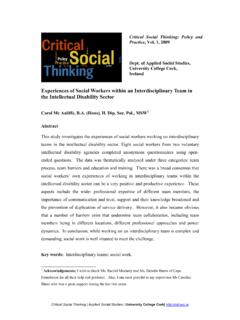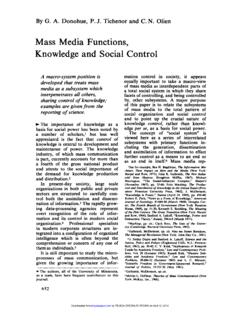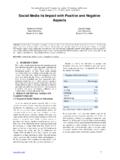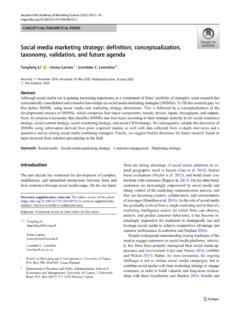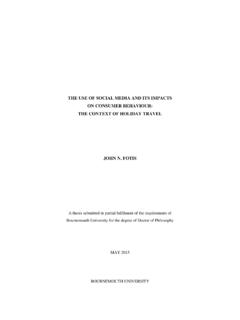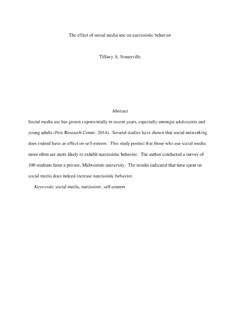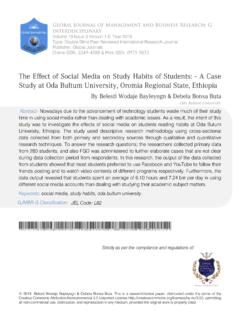Transcription of The Role of Supervision in Social Work: A critical analysis
1 The Role of Supervision in Social work : a critical analysis Jeanne Marie Hughes, BA (Early Childhood Studies), MSW Abstract This research explores the role of Supervision in Social work practice. It incorporates an analysis of the supervisory relationship between supervisor and supervisee and how this contributes to the Supervision process. The research also looks at the benefits and consequences of Supervision and how these impact on the work of the Social worker. The findings from this research show that Supervision plays a key role in good Social work practice.
2 Not only does it benefit the service offered to the client but also contributes to effective professional relationships. The research participants contended that Supervision is crucial for personal development and growth as a Social worker. Keywords: Supervision ; Social work ; reflective practice; personal growth; personal development. Introduction Supervision is a crucial part of reflective practice and an integral part of Social work (Fook, 1996). Against a backdrop of rapid societal and organisational change in Ireland, Social workers increasingly have to look for innovative solutions to their work with clients on a daily basis.
3 Supervision has, over the years, provided Social workers critical Social Thinking: Policy and Practice, Vol. 2, 2010 School of Applied Social Studies, University College Cork, Ireland critical Social Thinking: Policy and Practice, Vol. 2, 2010 critical Social Thinking | Applied Social Studies | University College Cork| 60 with the opportunity to reflect on their practice and afforded them the necessary forum to reflect, evaluate, discuss and develop these innovative solutions (Kadushin, 1992). The aims and objectives of my research were to explore the role of Supervision in Social work and whether Social workers feel adequate Supervision has a positive impact on their day-to-day work with clients and professionals.
4 I aimed to look at what Social workers feel encompasses effective Supervision and what encompasses ineffective Supervision , this also included what they feel is needed in a supervisor in order to provide appropriate Supervision . For example, a properly trained supervisor who is open to listening, giving feedback and a balanced Supervision session, contributes to good Supervision (Munson, 2002). Within the supervisory environment, Social workers should have the opportunity to critically analyse their knowledge, values and skills and their understanding of the work they are undertaking.
5 This forum should also provide a safe place for Social workers to reflect on their practice, decisions and interventions. Hence if these opportunities are not provided to the Social worker, there may be a knock on implications on the client- Social worker relationship. The question is, if a safe space whereby Social workers can critique and reflect and receive feedback and support in a non-biased way is not made available, could this lead to bad decision making or burn-out? Research Questions In order for supervisors to provide appropriate Supervision , I felt it was crucial to also explore the needs and wants of Social workers.
6 I believe it is only through the views and experiences of Social workers, that effective Supervision can truly be achieved. The aim of the research was incorporated in the following research questions: 1. What are Social workers views on the quality of their professional Supervision and its subsequent impact on their practice? 2. What aspects of Supervision do Social workers perceive as important for them to experience Supervision as a positive experience? critical Social Thinking: Policy and Practice, Vol.
7 2, 2010 critical Social Thinking | Applied Social Studies | University College Cork| 61 Literature Review Supervision has long been the hub of Social work and has had many traditions of Supervision (Gould and Baldwin, 2004). Supervision was a central method for early Social work teachers, researchers and practitioners in their effort to construct Social work practices and describe a theory of Social work (ibid: 31). As a result there have been many debates and discussions between these theorists and practitioners in regards to its meaning and function within Social work .
8 But what is Supervision ? Definition of Supervision Bromberg (1982) defines Supervision as a relationship between two people, one of who has the purpose of using it to improve his work with someone in his or her life and the other who has the purpose of helping him or her to do this (ibid, cited in, Inskipp & Proctor, 1995). Hess (1980) describes Supervision to be a quintessential interpersonal interaction that has a general goal whereby one person (the supervisor) meets with another (the supervisee) in an effort to make the work of latter more effective (ibid, cited in Hawkins and Shohet, 2002).
9 However Supervision is not a straightforward process, therefore defining it into a tangible product is as difficult as rigorously assessing its effectiveness (ibid: 5). In his book Staff Supervision in Social Care Tony Morrison (2003) illustrates Supervision to be a cooperative and facilitating process, which aims to: Develop the worker s effectiveness Provide a suitable and appropriate forum for the worker to assure those to whom he or she is accountable that he or she is acting responsibly Develop the worker as a professional person (ibid, 2003: 30) critical Social Thinking: Policy and Practice, Vol.
10 2, 2010 critical Social Thinking | Applied Social Studies | University College Cork| 62 Supervision is a safe, confidential relationship whereby an opportunity is provided to reflect, question and seek guidance on a regular basis. It is seen as a supportive environment (Page & Wosket, 1994). Kadushin (2003) has defined Supervision in the following terms: the critical examination of ideas and practice even of one s own personality (ibid: 123). Supervision also has a more clinical definition, which Morrison (1993) points out as.
